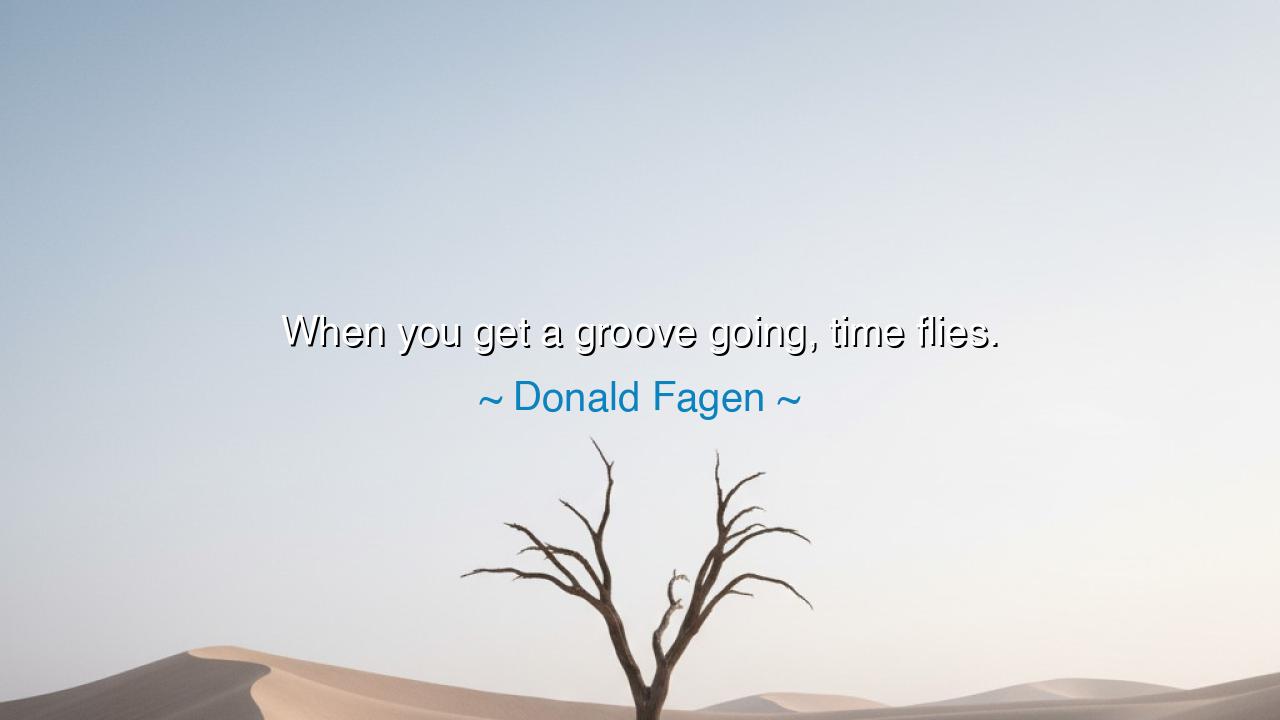
When you get a groove going, time flies.






The musician and poet of rhythm, Donald Fagen, once declared: “When you get a groove going, time flies.” Though his words arose from the world of music, where melodies and rhythms flow like rivers of the soul, they carry a wisdom far greater than notes and chords. For they speak of that mysterious state where effort becomes joy, where the burden of time dissolves, and where human beings touch the eternal through their work, their art, their passion.
To find a groove is to discover harmony between self and task, between heart and action. It is the state where struggle gives way to flow, where each motion leads naturally to the next, and where the world itself seems to move with you rather than against you. In such a state, hours slip past unnoticed, for the spirit has ceased to count them. This is why Fagen says, “time flies.” It is not that time itself changes, but that in the groove, the soul transcends its weight, and the mortal steps briefly into the freedom of the eternal.
Consider the life of Michelangelo, bent beneath the dome of the Sistine Chapel. He labored for years, painting scenes of creation and judgment upon the ceiling. To an outsider, it must have seemed endless, backbreaking, filled with tedium and fatigue. Yet for Michelangelo, though he knew pain and frustration, there were also days when his brush moved as if guided by a higher hand, when the fresco seemed to paint itself. In those hours, time ceased to oppress him. The groove of his art carried him, and though years passed, his work endured as if created in a single breath.
The meaning of Fagen’s saying, then, is not only for musicians or artists, but for all who labor. It reveals that joy is not found merely in the end of a task, but in the rhythm discovered within it. When the mind is scattered, each moment drags; but when the heart is focused, each moment becomes light. To live in this way is to transform duty into delight, and necessity into freedom.
Yet there is also warning in these words. For not every groove leads to greatness. One may fall into the rhythm of destruction, the flow of vice, the habit of waste. In such a groove, time also flies, but toward ruin rather than triumph. Thus the wisdom is not merely to find a groove, but to choose it well—to align it with creation, growth, and beauty, rather than idleness or decay.
The lesson is clear: seek the work, the art, the calling that brings you into rhythm with yourself and with life. When you feel time vanish in your labors, know that you have touched upon your path. Nurture that state. Do not chase only the end, but savor the flow itself. For life is not counted only in years, but in the depth of hours lived fully, without resistance, in the joy of the groove.
Practical action lies in practice. Begin your tasks with focus; remove distractions that scatter the mind. Approach your work not as burden but as dance, seeking its rhythm, however small. Musicians find it in beat, writers in words, workers in the repetition of their craft. When you feel it, guard it—let it carry you, for in those moments, you are not merely passing time, but transcending it.
Thus, O children of tomorrow, remember the wisdom hidden in Donald Fagen’s words: “When you get a groove going, time flies.” For in that flight is freedom, in that rhythm is meaning, and in that state lies the secret of turning labor into joy, and fleeting hours into eternity.






AAdministratorAdministrator
Welcome, honored guests. Please leave a comment, we will respond soon